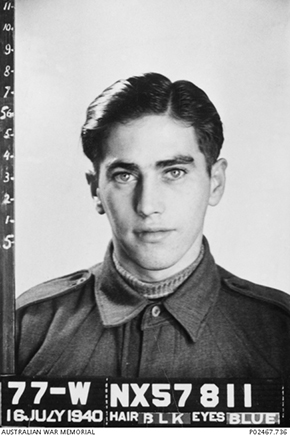 Reading through the pages of old editions of the Nepean Times this past week, the bluntness of war really hit home.
Reading through the pages of old editions of the Nepean Times this past week, the bluntness of war really hit home.
Without the Internet, social media, mobile phones or direct communication with their loved ones, those left behind simply had to wait.
They were waiting for one of two things to happen – their loved one to return home, or a telegram delivering bad news. There was almost no inbetween.
For my great grandfather Bernard Mulligan, the first telegram arrived some time around May 1942.
It read: “I have been directed by the Minister for the Army to advise you that no definite information is at present available in regard to the whereabouts or circumstances of your son, Private Ronald Phillip Mulligan.”
It’s hard to imagine the fear, concern and sadness that would have been running through Bernard Mulligan’s body when the next telegram arrived some two months later.
“I am directed by the Minister for the Army to advise you that he must now be posted as missing, and to again convey to you the Minister’s sincere sympathy.”
At that stage, it’s probably fair to say that Bernard Mulligan knew the fate that his son Ronald had or was going to meet.
But it would take some three painstaking years before the grim reality was confirmed.
 In a hand written telegram, the tragic reality of war hit home for Bernard Mulligan and his family, including my grandmother Mary who passed away last year, forever holding her brother’s memory close to her heart.
In a hand written telegram, the tragic reality of war hit home for Bernard Mulligan and his family, including my grandmother Mary who passed away last year, forever holding her brother’s memory close to her heart.
“It is with deep regret that I have to inform you that NX57811, Private Ronald Phillip Mulligan, died whilst a Prisoner of War in Sandakan, Borneo on 21st February 1945, and desire to convey to you the profound sympathy of the Minister for Army.”
When he left to fight for his country, Ronald Phillip Mulligan was yet to celebrate his 21st birthday.
He died at the tender age of 24.
My grandmother spoke of her brother highly and often feverishly researched Sandakan and the tragic impact war had on her family.
She always used to say that when she said goodbye to him when he left to fight for what he believed in, that she could feel she’d never see him again.
When ANZAC Day comes around every year, many of us wake up early and head to the Dawn Service.
It is a time of important reflection and tribute. For each individual, there’s a slightly different reason they’re there and a mixture of feelings running through their thoughts.
One thing we should all reflect on is how lucky we are. And how much we owe those who served our country, many losing their lives so we could live ours in the high standards we do today.
It is so important that ANZAC Day continues to thrive as it will be harder and harder for new generations to make a personal connection to the first and second World War, and for them to understand how it changed our country and ultimately, their lives today.
That is hardly their fault – time heals all wounds, they say, and the younger generations will have their own tragedies and world events to commemorate and remember.
However, there is no question that all of us, at times, take for granted the opportunities we have today as a result of those who came before us.
And that’s not just in relation to those who fought on battlefields.
Every generation could do with showing just a little more respect to those who have ‘been there, done that’.
On Tuesday, especially if you haven’t done it before, set the alarm nice and early and head to the ANZAC Day service in Penrith, St Marys or even the Sydney CBD. Take your kids, too. But make sure that somewhere between the early morning reflection and the two-up, you explain to them what the day is really about. They might not totally understand it, but if in the very least they respect it, it’s a mighty good start.
Lest we forget.

Troy Dodds is the Weekender’s Managing Editor and Breaking News Reporter. He has more than 20 years experience as a journalist, working with some of Australia’s leading media organisations. In 2023, he was named Editor of the Year at the Mumbrella Publish Awards.

